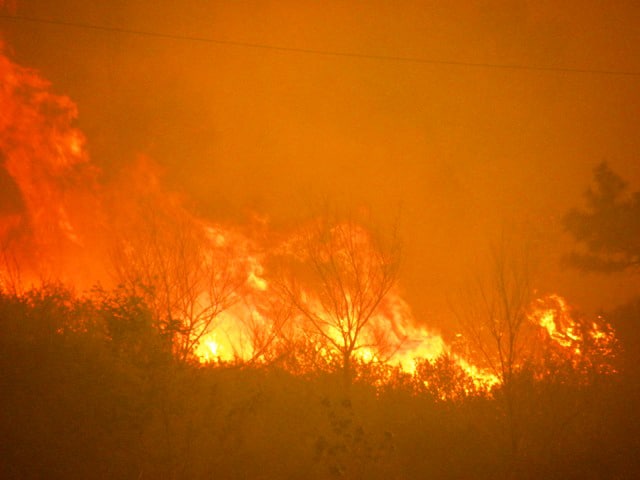In late June of 1988, just under 24 years ago, NASA’s James Hansen testified before the U.S. Congress about global warming. He noted that the Earth had been remarkably warm in the months leading up to that moment, and said he was 99 percent certain that the overall warming trend in the temperature data was due to human causes. ”It is time to stop waffling so much and say that the evidence is pretty strong that the greenhouse effect is here,” Hansen stated. (His actual testimony is here.)
Hansen’s testimony put global warming on the national agenda—and the reason for its dramatic impact isn’t hard to see. It was given during a time when Washington D.C. was suffering from sweltering heat, just as it is now; when Yellowstone National Park was ablaze due to drought-induced wildfires; and when the Atlantic Ocean would soon serve up Category 5 Hurricane Gilbert, then the most intense storm ever measured in the Atlantic basin.
In other words, events were highly conducive to climate change hitting the national agenda—and Hansen’s testimony was itself pegged to those events. Hansen even stated that the frequency of hot summers in Washington, DC had already increased enough to be noticeable to the average person.
Once again, this was 24 years ago. And I point it out because right now, we are clearly witnessing another of those agenda-setting summers—or at least, we should be.
This time, the wildfires are in Colorado, rather than in Yellowstone. This time, the heat waves are even more intense and widespread. And once again, scientists are linking the kind of weather we’re seeing to global warming—and doing so, frankly, with ever-increasing boldness. And no wonder: This year the U.S. is setting 7 new heat records for every new cold record, a lopsided ratio that is precisely what you would expect to see in the context of an overall warming trend.
And yet, is any agenda being set? Is anyone taking action? No: And it’s just more evidence that in the United States, politics are pretty much completely broken.
The time to act on global warming is clearly now—right now. In a sane world, Congress would immediately take up carbon cap legislation, and President Obama would be giving a big speech on the issue–and pressing Mitt Romney to explain why he flip-flopped into climate skeptic land, moving in precisely the wrong direction on one of the most important issues to afflict humanity.
Moreover, President Obama would recognize this as a smart political move, because the hard-core deniers notwithstanding, public opinion on global warming follows the weather. It always does. Now, with the whole country wondering about the sweltering heat, about the wildfires and the derecho and the destruction, people are more than ready to hear that, yes, this is global warming, and yes, something has to be done about it.
And yet still, it is not happening.
I cannot overemphasize how dramatic a missed opportunity this is–because we know that even against the backdrop of an overall warming trend, the weather is extremely fickle, and so is public opinion. In late 2009, the year of ClimateGate, and then in early 2010 (of “Snowmageddon” fame), public doubts about climate change increased in association with winter weather—and that could happen once again as soon as the end of this year.
Why are we so dysfunctional? That’s a massive question, and of course ever-increasing Republican irrationality and intransigence is a huge part of the picture (cf, The Republican Brain). Even if President Obama or Senate Democrats tried to do something, the Republican Congress would block any action.
Meanwhile, the media today are far worse at covering global warming than they were back in 1988. In those days, the late Stephen Schneider could actually fret that journalists were too readily linking global warming to weather disasters, without carefully explaining the scientific context. Would that that were the problem today. On the contrary, Media Matters has recently shown that journalists are overwhelmingly failing to discuss global warming in the context of the Colorado wildfires.
So the question becomes, what is it going to take to reverse these trends, of media irresponsibility and political dysfunction? If the last two weeks’ events aren’t enough to push global warming over the top, what will be?
I don’t know any more. But I do know this: Once summer passes, it won’t get easier. It gets harder—and we can’t afford to miss any more moments like this one.
Subscribe to our newsletter
Stay up to date with DeSmog news and alerts






